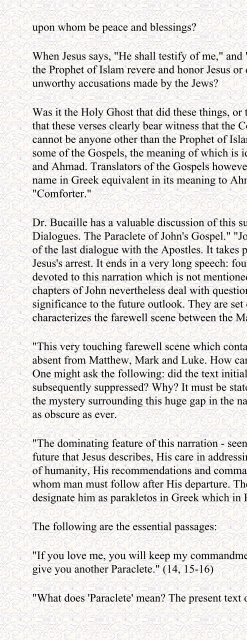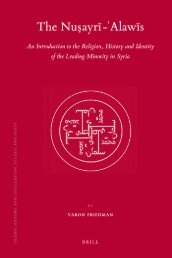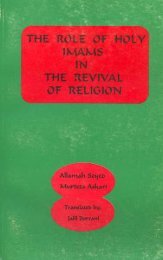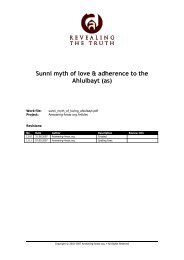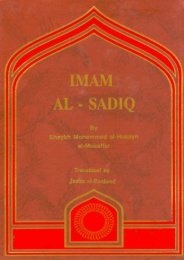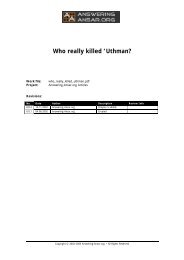Seal of the Prophets and His Message
Seal Of The Prophet & His Message - Shia Multimedia
Seal Of The Prophet & His Message - Shia Multimedia
- No tags were found...
Create successful ePaper yourself
Turn your PDF publications into a flip-book with our unique Google optimized e-Paper software.
upon whom be peace <strong>and</strong> blessings?<br />
When Jesus says, "He shall testify <strong>of</strong> me," <strong>and</strong> "he shall glorify me," did anyone o<strong>the</strong>r than<br />
<strong>the</strong> Prophet <strong>of</strong> Islam revere <strong>and</strong> honor Jesus or defend <strong>the</strong> innocence <strong>of</strong> Mary against <strong>the</strong><br />
unworthy accusations made by <strong>the</strong> Jews?<br />
Was it <strong>the</strong> Holy Ghost that did <strong>the</strong>se things, or <strong>the</strong> Prophet <strong>of</strong> Islam? In addition to <strong>the</strong> fact<br />
that <strong>the</strong>se verses clearly bear witness that <strong>the</strong> Comforter, <strong>the</strong> Holy Ghost, <strong>the</strong> Spirit <strong>of</strong> truth,<br />
cannot be anyone o<strong>the</strong>r than <strong>the</strong> Prophet <strong>of</strong> Islam, we also encounter <strong>the</strong> world "Paraclete" in<br />
some <strong>of</strong> <strong>the</strong> Gospels, <strong>the</strong> meaning <strong>of</strong> which is identical with that <strong>of</strong> <strong>the</strong> named Muhammad<br />
<strong>and</strong> Ahmad. Translators <strong>of</strong> <strong>the</strong> Gospels however have taken <strong>the</strong> work perikletos, a proper<br />
name in Greek equivalent in its meaning to Ahmad, to be parakletos, translating this as<br />
"Comforter."<br />
Dr. Bucaille has a valuable discussion <strong>of</strong> this subject in <strong>the</strong> Chapter called "Jesus's Last<br />
Dialogues. The Paraclete <strong>of</strong> John's Gospel." "John is <strong>the</strong> only evangelist to report <strong>the</strong> episode<br />
<strong>of</strong> <strong>the</strong> last dialogue with <strong>the</strong> Apostles. It takes place at <strong>the</strong> end <strong>of</strong> <strong>the</strong> Last Supper <strong>and</strong> before<br />
Jesus's arrest. It ends in a very long speech: four chapters in John's Gospel (14 to 17) are<br />
devoted to this narration which is not mentioned anywhere in <strong>the</strong> o<strong>the</strong>r Gospels. These<br />
chapters <strong>of</strong> John never<strong>the</strong>less deal with questions <strong>of</strong> prime importance <strong>and</strong> fundamental<br />
significance to <strong>the</strong> future outlook. They are set out with all <strong>the</strong> gr<strong>and</strong>eur <strong>and</strong> solemnity that<br />
characterizes <strong>the</strong> farewell scene between <strong>the</strong> Master <strong>and</strong> <strong>His</strong> disciples.<br />
"This very touching farewell scene which contains Jesus's spiritual testament is entirely<br />
absent from Mat<strong>the</strong>w, Mark <strong>and</strong> Luke. How can <strong>the</strong> absence <strong>of</strong> this description be explained?<br />
One might ask <strong>the</strong> following: did <strong>the</strong> text initially exist in <strong>the</strong> first three Gospels? Was it<br />
subsequently suppressed? Why? It must be state immediately that no answer can be found;<br />
<strong>the</strong> mystery surrounding this huge gap in <strong>the</strong> narrations <strong>of</strong> <strong>the</strong> first three evangelists remains<br />
as obscure as ever.<br />
"The dominating feature <strong>of</strong> this narration - seen in <strong>the</strong> crowning speech - is <strong>the</strong> view <strong>of</strong> man's<br />
future that Jesus describes, <strong>His</strong> care in addressing <strong>His</strong> disciples <strong>and</strong> through <strong>the</strong>m <strong>the</strong> whole<br />
<strong>of</strong> humanity, <strong>His</strong> recommendations <strong>and</strong> comm<strong>and</strong>ments <strong>and</strong> <strong>His</strong> concern to specify <strong>the</strong> guide<br />
whom man must follow after <strong>His</strong> departure. The text <strong>of</strong> John's Gospel is <strong>the</strong> only one to<br />
designate him as parakletos in Greek which in English has become Paraclete.<br />
The following are <strong>the</strong> essential passages:<br />
"If you love me, you will keep my comm<strong>and</strong>ments. And I will pray <strong>the</strong> Fa<strong>the</strong>r, <strong>and</strong> he will<br />
give you ano<strong>the</strong>r Paraclete." (14, 15-16)<br />
"What does 'Paraclete' mean? The present text <strong>of</strong> John's Gospel explains its meaning as


